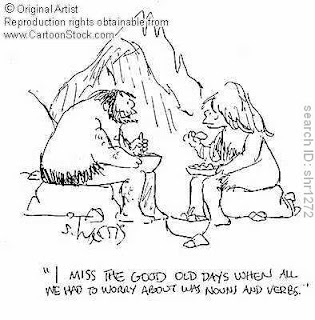Alan Ferko's face turned as red as Bo Peep's pigtail ribbons. -- Jerry Spinelli, Stargirl (2000)
Simile:
"He [felt] a throbbing like a snake slithering in and out of the tendons in his left leg." -- Kim Russon writing Giver Chapt 24, 2/4/03
Another sample simile: from Heat by Mike Lupica, pg 3
"He . . . saw the fat cop. . . wobbling like a car with a flat tire. . . . "
___________________________________________________
And, of course, metaphor can go astray!
Metaphor and Simile – Bad Examples
Subject: FUN - Metaphorically speaking
From: "Shawn Holmstead"
Date: Fri, November 09, 2007 3:57 pm
To:
Every year, English teachers from
across the USA can submit their
collections of actual analogies and
metaphors found in high school
essays. These excerpts are published
annually to the amusement of
teachers across the country. Here are
some recent winners.
1. Her face was a perfect oval, like a
circle that had its two sides
gently compressed by a Thigh Master.
2. His thoughts tumbled in his head,
making and breaking alliances
like underpants in a dryer without
Cling Free.
3. He spoke with the wisdom that can
only come from experience, like a
guy who went blind because he looked
at a solar eclipse without one of
those boxes with a pinhole in it and
now goes around the country
speaking at high schools about the
dangers of looking at a solar
eclipse without one of those boxes
with a pinhole in it.
4. She grew on him like she was a
colony of E. Coli, and he was
room-temperature Canadian beef.
5. She had a deep, throaty, genuine
laugh, like that sound a dog makes
just before it throws up.
6. Her vocabulary was as bad as, like,
whatever.
7. He was as tall as a six-foot,
three-inch tree.
8. The revelation that his marriage of
30 years had disintegrated
because of his wife's infidelity came
as a rude shock, like a
surcharge at a formerly surcharg
e-free ATM machine.
9. The little boat gently drifted
across the pond exactly the way a
bowling ball wouldn't.
10. McBride fell 12 stories, hitting
the pavement like a Hefty bag
filled with vegetable soup.
11. From the attic came an unearthly
howl. The whole scene had an
eerie, surreal quality, like when
you're on vacation in another city
and Jeopardy comes on at 7:00 p.m.
Instead of 7:30.
12. Her hair glistened in the rain
like a nose hair after a sneeze.
13. The hailstones leaped from the
pavement, just like maggots when
you fry them in hot grease.
14. Long separated by cruel fate, the
star-crossed lovers raced across
the grassy field toward each other
like two freight trains, one having
left Cleveland at 6:36 p.m. travelling
at 55 mph, the other from
Topeka at 4:19 p.m. at a speed of 35
mph.
15. They lived in a typical suburban
neighbourhood with picket fences
that resembled Nancy Kerrigan's teeth.
16. John and Mary had never met. They
were like two hummingbirds who
had also never met.
17. He fell for her like his heart was
a mob informant, and she was
the East River .
18. Even in his last years, Granddad
had a mind like a steel trap,
only one that had been left out so
long, it had rusted shut.
19. Shots rang out, as shots are wont
to do.
20. The plan was simple, like my
brother-in-law Phil. But unlike Phil,
this plan just might work.
21. The young fighter had a hungry
look, the kind you get from not
eating for a while.
22. He was as lame as a duck. Not the
metaphorical lame duck, either,
but a real duck that was actually
lame, maybe from stepping on a land
mine or something.
23. The ballerina rose gracefully en
Pointe and extended one slender
leg behind her, like a dog at a fire
hydrant.
24. It was an American tradition, like
fathers chasing kids around
with power tools.
25. He was deeply in love. When she
spoke, he thought he heard bells,
as if she were a garbage truck backing
up.
















